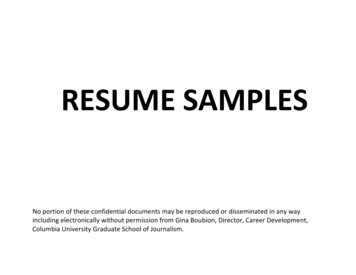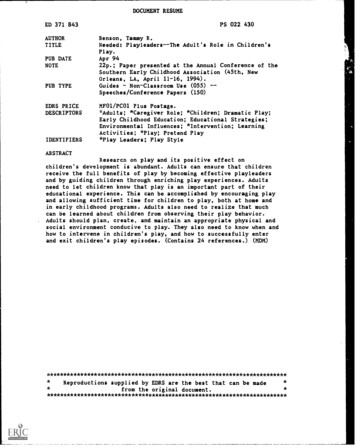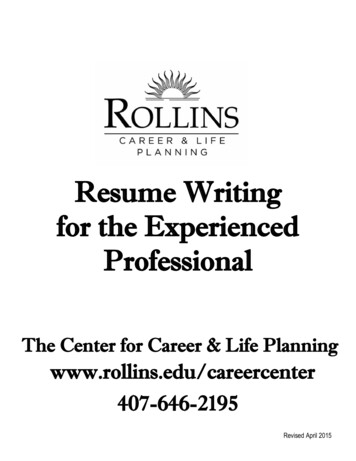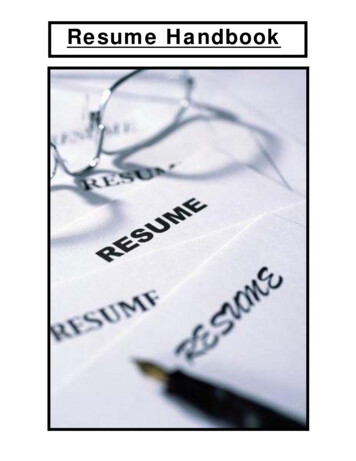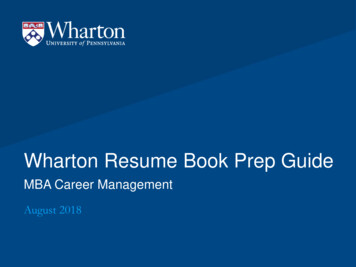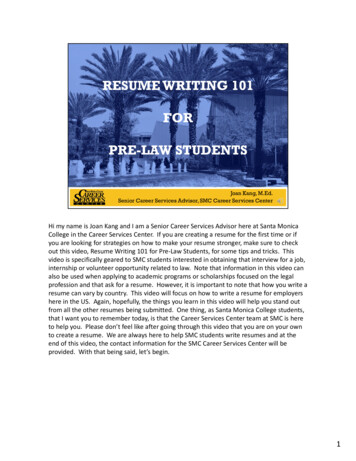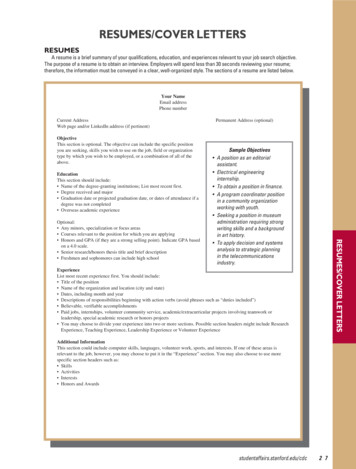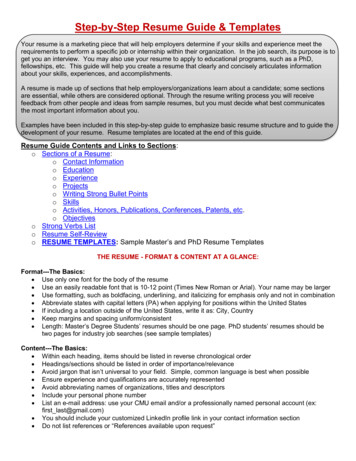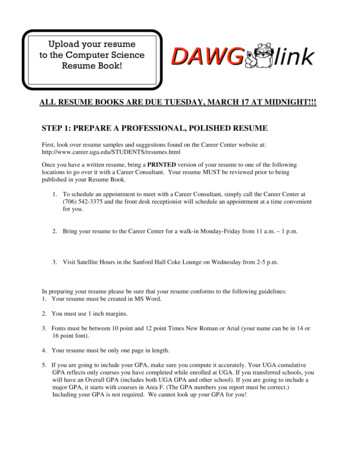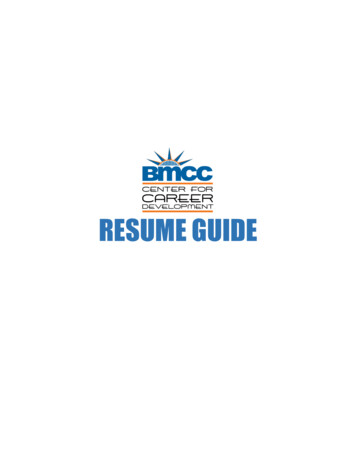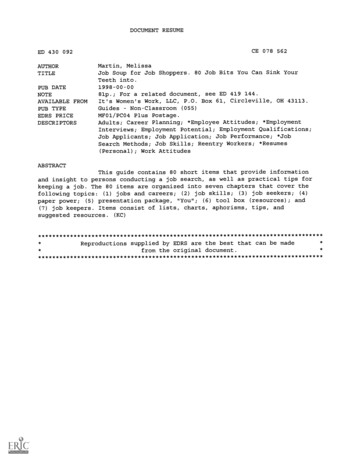
Transcription
DOCUMENT RESUMEED 430 092AUTHORTITLEPUB DATENOTEAVAILABLE FROMPUB TYPEEDRS PRICEDESCRIPTORSCE 078 562Martin, MelissaJob Soup for Job Shoppers. 80 Job Bits You Can Sink YourTeeth into.1998-00-0081p.; For a related document, see ED 419 144.It's Women's Work, LLC, P.O. Box 61, Circleville, OH 43113.Non-Classroom (055)GuidesMF01/PC04 Plus Postage.Adults; Career Planning; *Employee Attitudes; *EmploymentInterviews; Employment Potential; Employment Qualifications;Job Applicants; Job Application; Job Performance; *JobSearch Methods; Job Skills; Reentry Workers; *Resumes(Personal); Work AttitudesABSTRACTThis guide contains 80 short items that provide informationand insight to persons conducting a job search, as well as practical tips forkeeping a job. The 80 items are organized into seven chapters that cover thefollowing topics: (1) jobs and careers; (2) job skills; (3) job seekers; (4)paper power; (5) presentation package, "You"; (6) tool box (resources); and(7) job keepers. Items consist of lists, charts, aphorisms, tips, andsuggested resources. ************************************Reproductions supplied by EDRS are the best that can be made**from the original ***************************************
,tI.S. DEPARTMENT OF EDUCATIONffice of Educational Research and ImprovementUCATIONAL RESOURCES INFORMATIONCENTER (ERIC)This document has been reproduced asreceived from the person or organizationoriginating it.0 Minor changes have been made toimprove reproduction quality.Points of view or opinions stated in thisdocument do not necessarily representofficial OERI position or policy.PERMISSION TO REPRODUCE ANDDISSEMINATE THIS MATERIAL HASBEEN GRANTED BYTO THE EDUCATIONAL1RESOURCESINFORMATION CENTER (ERIC)-11mmMP'80 JOB Bites You CanSink Your Teeth IntoMelissa MartinJOB CoachBEST COPY AVAILABLE2
INTRODUCTIONJOB Soup is a short resource guide designed for the purpose of giving quick and concisejob tips. I dedicate this book to the job-hunters who- have stepped into my office withhopes for better jobs and brighter futures. Remember, the squeaky wheel gets the greasebut the pesky fly gets the flyswatter!Tip of the day:Learn from your past, apply it to your future, and live in thepresent [and when the world gives you lemons, make lemon-aid]i.Then turn it into a profitable business.Contact Melissa at:It's Women's Work, LLCP.O. Box 61Circleville, Ohio 43113Copyright C 1998, by It's Women's Work PressPrinted in the United States of AmericaAll rights reserved. No part of this publication may be reproduced, stored in a retrievalsystem, or transmitted, in any form or by any means, electronic, mechanical,photocopying recording , or otherwise, without the prior written permission of thepublisher.Use power to help people. For we are given power not to advance our own purposes norto make a show in the world, nor a name. There is but one just use of power and it is toserve people.144BEST COPY AVAILABLE.
CONTENTSJOB Soup for JOB ShoppersChapter 1Jobs and CareersJOB Bite #1JOB Bite #2JOB Bite #3JOB Bite #4JOB Bite #5JOB Bite #6JOB Bite #7JOB Bite #8Make a Job and Career ConnectionWhich Door Opens Your Future?What is the Best Job in America?Job and Career InterestsCareers/Jobs Without CollegeJob/Career Changes in a Changing WorldPersonality Puzzle PiecesThe Value of Your Work ValuesChapter 2Job SkillsJOB Bite #9JOB Bite #10JOB Bite #11JOB Bite #12JOB Bite #13JOB Bite #14What are Job Skills?Job TalkPersonal Job SkillsTravel Job SkillsAction Job SkillsJob Skills for HomemakersChapter 3Job SeekersJOB Bite #15JOB Bite #16JOB Bite #17JOB Bite #18JOB Bite #19JOB Bite #20JOB Bite #21JOB Bite #22JOB Bite #23JOB Bite #24JOB Bite #25JOB Bite #26JOB Bite #27JOB Bite #28Ten Commandments of Job SeekersWhere the Jobs Are!Number One Job MethodThe 3 Best Ways to Find JobsThe 3 Worst Ways to Find JobsSun and Snow Job ContactsDialing for JobsTen Terrific Telephone TechniquesTry the Yellow PagesTen Strategies for Help Wanted AdsVolunteer Work is WorkJob SabotageJob Hunting is a Job!Who Has the Power to Hire You?Chapter 4Paper PowerJOB Bite #29JOB Bite #30Your Paper PackagePositive Points to Ponder for Applications4
IIJOB Bite #31JOB Bite #32JOB Bite #33JOB Bite #34JOB Bite #35JOB Bite #36JOB Bite #37JOB Bite #38JOB Bite #39JOB Bite #40Ten Step Cover Letter FormulaWhat is a Resume?Ten Commandments of ResumesTen Sins of ResumesResume Scan-LandElectronic ResumesResume ServicesTen Super Suggestions for ReferencesTen Point Approach to Thank You LettersPortfolio PowerChapter 5Presentation Package, "YOU"JOB Bite #41JOB Bite #42JOB Bite #43JOB Bite #44JOB Bite #45JOB Bite #46JOB Bite #47JOB Bite #48JOB Bite #49JOB Bite #50JOB Bite #51JOB Bite #52The "Inner-View" InterviewInterviewing InsightInterview PhobiaJob ClothesTraditional Job InterviewsNew Behavioral Job InterviewsWhy Should I Hire You?E.T's-Etiquette and Taboos of InterviewsP's and Q's of Job InterviewsGroup InterviewsStress InterviewsFourteen Tips on Job RejectionChapter 6Tool BoxJOB Bite #53JOB Bite #54JOB Bite #55JOB Bite #56JOB Bite #57JOB Bite #58JOB Bite #59JOB Bite #60JOB Bite #61JOB Bite #62JOB Bite #63JOB Bite #64JOB Bite #65JOB Bite #66JOB Bite #67JOB Bite #68Check Out the Library!Job Hunter's BibleFantastic Job Skills Guide!Get the DOT! [Dictionary of Occupational Titles]Get the 00H! [Occupational Outlook Handbook]Jobs for People Without College DegreesBook LookJobs Via the InternetBooks About Jobs in Other CountriesThe Federal Job SearchTop Ten Lists13 Rules13 ToolsCareer Counselors and Job CoachesEmployment EvaluationTemporary Employment Agencies
Chapter 7Job KeepersJOB Bite #69JOB Bite #70JOB Bite #71JOB Bite #72JOB Bite #73JOB Bite #74JOB Bite #75JOB Bite #76JOB Bite #77JOB Bite #78JOB Bite #79JOB Bite #80Ten Ways to Keep Your JobJob Survivor Warning SignsWhy Workers are FiredYour Job-a-tude AttitudeComputers Are Here to Stay!Ai-e you Bondable?Alcohol and Drug TestingJob FactorsWorkplace RightsTen Commandments of Job KeepersBe a Problem-SolverStress Busters
Chapter 1JOB Bites JOB Bites JOB Bites JOB Bites JOB Bites JOB Bites JOB BitesJobsandCareersJOB Bites #1 to #8Chapter Goal: To help you understand the vitalrole of jobs and careers in the world of workThat state is a state of Slavery in which a man doeswhat he likes to do in his spare time and in hisworking time that which is required of him.Eric Gill7
JOB Bite #1IIIIIIpIIIIIIMake a Job and Career ConnectionJob-hunters need to be informed about different options before they choose a career/job. Reading,understanding, and implementing the following recommendations is a start to choosing a career and a job.What Is A Career?The American Heritage Dictionary states: A chosen pursuit the general course of one's focusA career is also your preparation to do a certain kind of work.The terms "career" and "job" have different meaning:career field of employment you've chosen your career stays with you what you are trained to do./t specific agreement with an employer you leave your job at the end of the day what you are paid to doWhy Do I Need A Career?Careers provide job satisfaction, money, and meaning to our lives.How Do I Choose A Career?Three of the most important decisions people make are choosing a marriage partner, choosing a home,and choosing a career.Ask yourself 4 questions:1. What do I want?3. What needs to be done?2. What can I do?4. How can I get the job I want?Career tools to use to find a career:self-assessmentbooks and videoscareer planningcareer counselorsresearchjob shadowingAsk yourself 3 more questions:1. What are my interest, values, personal qualities, and skills?2. What do I enjoy doing?3. Do I want to spend time with people or machines?Why do people choose different otivationreligionhelp otherscareer inventoriespart-time employmentfringe benefitsaptitudeCHOOSE YOUR CAREER WISELY!IRi8
JOB Bite #2Which Door Opens Your loyment-NP-Vocational SchoolP.Community CollegeNir CollegeprHomemakerJob-hunters will have to pick door #1,2,3,4, 5, 6, or 7. Which door will you choose? STOP! Beforeyou choose a door you need to look at all your options and seek information from several sources:*case workers/job workers*career counselors*employers*interview people who are employed in the field where you would like to work*admission directors at colleges*talk to students at small and large universities*work at a variety af summer jobs to find out what you.like to do*look at your talents, interests, skills, abilities, and aptitude*fill out career inventories, personality inventories, and do a self-assessment*identify your strengths and weaknesses*research careers at your public library*check out books about different types of employment*job shadow a person while they are at work to learn about his/her duties*research labor-market information and employment trends*look at all areas of yourself intellectual, physical, emotional, and spiritual*search the Internet for information about careers and employmentWHICH DOOR WILL YOU CHOOSE?9
JOB Bite #3What Is the Best Job in America?According to The Top Ten of Everything 1996 by Russel Ash:Top Ten Least Stressful Jobs in the USmusical instrument repairerindustrial machine repairermedical records technicianpharmacistsoftware engineertypist/word processorlibrarianjanitorbookkeeperforklift operatorTop Ten Most Stressful Jobs in the USUS presidentfirefightersracing car driverastronautsurgeonnational football league playerpolice officerosteopathhighway patrol officerair traffic controllerSome jobs may seem odd to the general public but one size does not fit all in the employment market:4ant catcher-digs up live ants for use in plastic ant farms egg breaker-separates yolk and white of eggs for use in food products by striking eggs against a bar flush tester-tests channels of toilet bowls by flushing rags down the channelsThe best job is the one you most enjoy doing and it is an even better job when you are paid a fairsalary or you make a profit if you are self-employed. The best job for you utilizes your job skills,personality traits, value system, interests, and provides growth and challenges.10
47IIJOB Bite #4Career and Job InterestsWhat are your career and job interests? One way to find out is to take a look at the following threecategories. Which fits you best?people: doing things for or with other people* data: working with numbers or other kinds of data* things: doing work with your hands or using equipment, machinery, or toolsList the job-related tasks that you like to do and also ask yourself the following questions aboutemployment:What are my likes?What are my dislikes?What do I enjoy doing the most?John Holland, an expert in the field of careers, identified six basic people/work environments. People willfit into one or two of these categories. Which fits you best?ARealistic: people who enjoy concrete, physical tasks and enjoy working with or operating machines,objects and equipment.AInvestigative: people who enjoy tasks calling for problem solving, analyimg and evaluation or seekingnew solutions.AArtistic: people who enjoy creating, viewing new ideas in an imaginative way.ASocial: people who enjoy helping, serving, teaching, and supporting people.AEnterprising: people who enjoy directing, supervising people or projects, selling products or services,or leading others.AConventional: people who enjoy tasks that involve math, numbers, and figures.Learning about yourself is an important part of finding a career and a job that you will enjoy. As a fulltime employee, you will spend 40 hours or more per week, 160 hours per month, and 2,080 hours peryear at work. [Numbers do not include vacations or paid holidays]11
JOB Bite #5Careers Without CollegeIs college for everyone? The answer is no. People are different. One size does not fit all. High schoolgraduates with jobs requiring training earn 7,500. more a year than those without job training. If a fouryear college degree is not your cup of tea, then try this 3-point approach to find your niche in the worldof work.#1 SELF-AWARENESSBe aware of your different #2 SELF-INVESTIGATIONAsk yourself the following questions:Are you flexible or do you like structure?Do you like to be indoors or outdoors?Are you a creator, helper, organizer, follower, or leader?Do you like to travel or stay in one place?What was your favorite subject in high school? English, Science, Math, Gym, History, etc.?Do you like to be around children or adults?Do you like to work with cmimals, nature, people, machines, etc?Do you like to work alone or in a group?#3 SELF-PREPARATIONThere are alternatives to a four-year college degree:/Apprenticeships for carpenters, masons, electricians, heavy machinery operations, etc.JOn the-job-training at factories, retail stores, managers of food service, etc.iTechnical/vocational schools for office technology, automotive/mechanic, childcare assistants,laboratory technicians, pharmacy technicians, etc./Community Colleges offer a variety of two-year Associate Degrees in computer science, humanresource services, law enforcement, etc./Military offers training in electronics, computers, law enforcement, etc.Self-employment by owning your own business in construction, boutiques, crafts, etc.12
JOB Bite #6Career Chanaes in A Chan2in2 WorldThe U.S. Department -of Labor tells us that the-average person will hold 7 jobs in his/her adult life.Before you change jobs or careers you will need to do a self-assessment of your physical, emotional, andspiritual health if you made this decision based on feelings of being unhappy, unsatisfied, and inadequate.Determine whether the conflict stems from inside or outside of you. Is it the work itself or problems withthe boss, co-workers, or job duties? You may just need a vacation, short-term counseling, or a heart-toheart discussion with your boss. Changing careers is not easy whether you are 25 or 65. Also, eachperson has abilities, which can be used in a large number of career fields. If you determine your presentjob is causing stress or boredom then read the following suggestions:reassess your top priorities in lifeask yourself these questions:What would I do with my talents, skills, and time i f I were financially secure?Haw will a career change effect my family?How will a different career fit into my value system?Am I willing to get additional training or take some college courses?Am I willing to relocate?Am I willing to take a cut in pay to do work I enjoy?Am I willing to invest my time in looking at other career and job optionssee a career/vocational counselor to discuss your options, do a self-assessment on your qualifications,job skills, talents, interests, strengths, weaknesses, values, lifestyle, likes, dislikes, etc., learn effective jobsearch skills, gain an understanding about types of jobs and what they require and to set short-term andlong-term career and employment goals [Do not rush into a career change]
;JOB Bite #7Personality Puzzle PiecesOne of the key ingredients for job satisfaction is knowing your personality profile. Yet, this essentialpuzzle piece is often overlooked in the employment arena. Webster's Dictionaty describes personality asthat which constitutes an individual a distinct person. Personality includes the way we act and react toour emotions, our temperament and disposition, and the way we use our talents and natural abilities.Workers possess different motivational levels, purposes, drives, and attitudes. Employees take theirpersonality every where they go.Hippocrates and many psychologists have identified four patterns/categories of personality and humanbehavior types. Which one are you?How does a worker identify his/her personality type?Career counselors use personality inventories and temperament surveys.40ne of the most popular personality profiles is the Myers-Brigs Type Indicator. For more informationsee the Internet URL: www.careerlab.com-1The Keirsey Character Sorter is an online (at no cost) 70-question inventory that determinestemperament type. See URL: www.Keursey.comGaining a clear understanding of your personality traits can be helpful in finding an occupational matchthat is right for you. Different personality types are not good or bad and all have strengths andweaknesses. Each employee can be successful as long as they are using their personality strengths as amajor part of work. Do not accept a job that does not fit. You will be miserable and soon quit.Find your personality profile!14
JOB Bite #8The Value of Your Work Values11Take a sheet of paper and list your ten most important values. From this list, choose your five mostimportant values and rank in order from least to most important. Examples of values:financial prosperityreligionrecognitionchallenging positioneducationjob securityachievementchance for promotionsintegrityhelping othersfamily timetrainingpaying debts volunteer activitiescommunicationvacation timeConflicts in compromising your value system at work can cause major stress and problems. List your topthree priorities in life. Do they fit into your job/career goals. If not, what do you need to change?11111115
Chapter 2POB Bites JOB Bites JOB Bites JOB Bites JOB Bites JOB Bites -JOB BitesJob SkillsJOB Bites #9 to #14Chapter Goal: Offers essential information abouthow to identify job your specific job skillsIf you were the employer, would you hire you?Author Unknown16BEST COPYAVAILABLE
Job Bite #9What Are Job Skills?Dick Gaither, author of Skillstalking, states a job skill is something you can do right now. Skills comefrom your life, your work, and your educational experiences. Some skills are from the natural talents youpossess. In the, Wizard of Work-88 Pages to Your Next Job (pp.7-25), Gaither writes that skills are anyspecial knowledge, behavior trait, or capability for which an employer will pay you.List your top 15 job skills by answering the following questions. Memorize these skills and be readyto tell any employer at any time.What can you do?How can you do it?How did you learn to do it?How can this job skill help the employer?JOB Bite #10Job TalkCan you talk the job talk and walk the job walk? It's called job/career vocabulary. Learn the terms,phrases, and words used for the employment position you want. Technology is constantly changing.Keep up with the popular buzzwords for your career field. Example: If you are a computer technician,keep updated on new programs by reading current magazine, talking with coworkers, and knowing whatthe competition is doing with software and hardware. Read newspapers and watch educationalprograms. Surf the Internet for new inventions, companies, and research data.If you are changing careers, find facts and information about the employment position beforescheduling job interviews. Identify what job skills are needed at specific jobs. The library is an excellentplace to find information about local and state businesses.17
JOB Bite #11Personal Job SkillsJob-hunters, knowing your job skills is a key to empowerment in the job market. Employers will askyou about your skills on the job application and in the interview. Answering the following questions willhelp you.I. What are my personal job skills? Your personal job skills are what make you---You. These skillsare taken to every job.EXAMPLE:0 honesty0 good sense of humor0 flexibility0 leadership0 dependability0 self-motivation0 creativity0 team playerWhat are my personal skills? To find out, ask yourself?1. What are my personality traits?2. List 3 things about yourself that make you think you are a good worker?3. What qualities do I have?JOB Bite #12Travel Job SkillsII. What are my travel job skills? Your travel job skills are general skills that can be useful in a varietyof jobs. Travel skills travel with you to every workplace.EXAMPLE:0 write clearly0 solving problems0 communicate verbally0 manage money0 detail-oriented0 advanced computer skills0 meeting deadlines0 organizing projectsWhat are my travel skills? To find out, ask yourself1. What skills can I use with any job?2. What are my general skills?3. What can I do well?18
JOB Bite #13Action Job SkillsM. What are my action skills? Knowing what you are good at is a BIG part of your job search.Your action skills are the specific things you can do.EXAMPLE:You are seeking a job as a manager. Your action skills are:0 employee evaluations0 supervising employees0 training employees0 office policy procedures0 payroll duties0 hiring employeesWhat are my action skills? To find out, ask yourself1. What did I learn during training at school, college, workshops, and seminars?2. What is my past work experience?4. What specific things can I do?Knowing your 3 types of job skills is essential for the job search! What are your PTA job skills? Theyare your personal, travel, and action skills.
Job Skills for HomemakersMany times, I have heard a homemaker state, 7 don't have any job skills. I've never worked before.I've been at home raising my children. Who would hire me?" Let me set you straight! Raising a familyis a full-time job. You have transferable job skills. The buzzword of today is:"TRANSFERABLE JOB SKILLS"What skills did you use as a homemaker that will transfer to the job anitation:meeting deadlines:problem solving:managing projects:operation of vehicles:public relations:sales experience:negotiated agreements:arranged social functions:community savvy:You paid the bills, bought groceries, and passed out lunch money.You planned meals, family vacations, and still kept your sanity.You delegated chores, and told who to do what, where, and how.You shopped, prepared, and cooked meals.You cleaned and scrubbed and cleaned and scrubbed some more.You picked up kids, dropped off kids, picked up dry cleaningYou were the referee for children's conflicts.How many science projects did you help create?Mom's taxi, you traveled here-there-and-everywhere!You attended teacher's conferences and PTA meetings.You helped sell Girl Scout cookies and Little League hotdogs.O.K., who gets the bathroom first?You planned birthday parties, slumber parties, and picnics, etc.You know who lives where and where to shop for almost anything.Add your special adaptive skills: dependable, responsible, good listener, punctual, honest, patience,compassionate, quick learner, hard-worker, etc. Homemakers, YOU do possess job-related skills!Now go out into the job market and show'em your transferable job skills!ResourcesNational Displaced Homemakers Network1625 K Street NW, Suite 300Washington, DC 20006 Phone: (202) 467-6346This is a grant-funded program that supports 1,100 regional programs that offer individual careercounseling, workshops on career planning, job-hunting, self-esteem, etc. Membership is 15 and includesa newsletter, "Network Moms". Call for the center nearest to you.00
Chapter 3OB Bites JOB Bites JOB BiteS JOB Bites JOB Bites--: JOB Bites JOB-BiteJob SeekersJOB Bites #15 to #281Chapter Goal: Contains proven and practical waysto fmd a jobCome Forth, Lazarus! And he came fifth and lost the job.James Joyce21BEST COPY AVAILABLE
JOB Bite #15THE TEN COMMANDMENTS OF JOB SEEKERSThou shall approach job-hunting like you would an actual job- and spend 40 hours per weeksearching for employment while making a schedule every week with a list of job search activities.1ILThou shall use the informal job market by asking family, friends, and acquaintances about jobopenings and thou shall follow up on any job-leads.1III.Thou shall knock on the door of any business, company, or organization where you would like towork, find the person who has the power to hire you and ask for an interview plus fill out jobapplications.IV.Thou shall use the Yellow Pages and the telephone to search for employment.V.Thou shall spend time at the public library researching employment information about thebusinesses, companies, and organizations where you would like to work plus scan the helpwanted ads and trade journals. Thou shall check out books or videos about job-hunting.VI.Thou shall visit employment agencies weekly to look for employment.VII.Thou shall practice interviewing techniques and prepare the answers to the top teninterview questions before the interviews.11VIII. Thou shall create error-free resumes, cover letters, and reference pages.1111IX.Thou shall use positive thinking and call yourself a job seeker instead of an unemployed person.X.Thou shall not give up on the job-search until employment is found.ttftruTr22
JOB Bite #16Where The Jobs Are!At this time in the economy most of the new jobs in the United States can be found at small organization.Approximately two-thirds of all workers are employed in small organizations:O 66% of workers work in small organization [1-250 employees]O 18% of workers work in medium-sized organizations [250-1,000 employees]0 16% of workers work in large organizations [over 1,000 employees]Advantages of working for smaller organizations are: greater opportunities for promotions, advancements, and raisessupervisors have more time to listen to your problem solving solutions and creative ideas greater chance for bonuses, flexible work time, and individual attention more parking spacesStatistical Sources: J1ST Works, Inc.23
JOB Bite #17Number One Job MethodHow do most people find jobs? A 1993 publication by JIST Works, Inc. states that 63% of jobseekers find jobs by talking to family, friends, and acquaintances. Answering ads in newspapers or tradejournals accounts for 14%. Public and private employment agencies help 12% of job seekers to obtainemployment.QUESTION: What is the informal [hidden] job market where 63% of people find jobs?ANSWER: According to HST it's jobs that are not advertised. Some examples are: personal contacts,friends, relatives, direct contact with employers, friends at church, and networking. An example ofnetworking would be where you make a list of 20 people you know and ask each person: 1. Do you know of any job openings for a person with my skills, work experience and talent? 2. Do you someone who knows of any job openings for a person with my skills and workexperience?Five Keys to Unlock the Hidden Job Market1. Many jobs are not advertised and are part of the hidden job market.2. Job seekers must find these hidden jobs.3. Many jobs that are open are filled by word of mouth.4. Family members, friends, and acquaintances know about potential job openings.5. Use the telephone to call to find unadvertised jobs and do not depend only on newspaper ads,employment agencies, and job applications.24
JOB Bite #181The 3 Best Ways to Find Jobs1. Network by asking friends, family members, acquaintances, people at church, etc., one simplequestion, "Do you know of any job openings for a person with my work experience?" Follow up onany job-leads.[33 out of every 100 job-hunters who use this method will find a job]2. Go directly to any business, employer, factory, or office where you would like to work:O fill out applications0 ask to speak to the person who does the hiring0 ask for a job interview and then ask for the job[53 out of every 100 job-hunters who use this method will find a job]3.Use the Yellow Pages phone book and your telephone:0 ask to speak with the person who does the hiringO sell your skills briefly and ask for an interviewO at the interview tell the employer that you want the job[31 out of every 100 job-hunters who use this method will find a job]Using all 3 of these top methods will increase your job opportunities. Work smarter at finding a job notharder.Source of statistics: The 1997 What Color Is Your Parachute? By Richard Nelson BollesJOB Bite #19The 3 Worst Ways to Find Jobs1. Mailing out mass quantities of resumes at random to any employer.[7 out of every 100 job-hunters who use this method will find a job]2. Answering job ads in trade journals.[7 out of every 100 job-hunters who use this method will find a job]3. Answering help-wanted ads in newspapers from distant cities and states.[10 out of every 100 job-hunters who use this method will fmd a job]Target a few companies where you would like to work before you mail out resumes. Researchinformation about these businesses at your public library or call the secretary. Do a follow up by callingthe employer to ask for an interview.Source of statistics: The 1997 What Color Is Your Parachute? By Richard Nelson Bolles25
.JOB Bite #201.Sun and Snow Job ContactsSun [warm] contacts are people you know. This list includes family, friends, relatives, acquaintances,people at church, your physician, dentist, or old high school friends, etc. Ask your warm contacts if theyknow of any openings for a person with your job skills and follow-up on any job leads immediately. Suncontacts are usually easier for job seekers to ask about employment information.Snow [cold] contacts are people you do not know. It is harder for some people to call upon strangersand ask for a job. Work is a partnership between employees and employers. You both need each other inthe workforce. The two most popular ways to make cold contacts are:'knocking on the employer's door without an appointment to ask for interviewsusing the telephone to call a business or company to seek hiring information and interviews.JOB Bite #21Dialin2 for JobsTelephone Job-lines.Many hospitals and universities have employment job-lines. Employment information is recorded andupdated regularly. A polite recorded voice will tell give you various information:Ojob openingsOqualifications for j
Job Hunter's Bible Fantastic Job Skills Guide! Get the DOT! [Dictionary of Occupational Titles] Get the 00H! [Occupational Outlook Handbook] Jobs for People Without College Degrees Book Look Jobs Via the Internet Books About Jobs in Other Countries The Federal Job Search Top Ten Lists 13 Rules 13 Too
